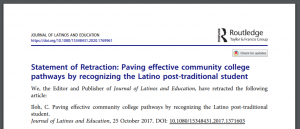An education researcher who had four papers flagged for plagiarism and citation issues threatened to sue the publisher and editors who decided to retract one of the articles, Retraction Watch has learned.
We obtained the emails containing legal threats by Constance Iloh, formerly an assistant professor at the University of California, Irvine, through a public records request. Iloh, who was named to Forbes’ “30 Under 30” top figures in education in 2016 and briefly taught at Azusa Pacific University after leaving Irvine, sued to prevent the university from giving us the emails, but after a two-year legal battle, a state appeals court affirmed the records should be released. That battle is described in more detail in this post.
Following our reporting in August 2020 on the retraction of one of Iloh’s articles for plagiarism, the disappearance of another, and the correction of two more, we requested post-publication correspondence between UCI, Iloh, and the journals where the papers had appeared.
The emails UCI released to us in May of this year shed light on the processes three journals took after concerns were raised about Iloh’s work, and how she responded.
Continue reading Exclusive: Author threatened to sue publisher over retraction, then sued to block release of emails








